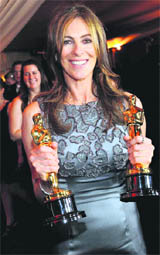|
Unfair play
It has taken more than 80
years for the Oscar to be awarded to a woman director. This
shows that Hollywood remains as male-dominated as ever,
says Geoffrey
Macnab
|

Kathryn Bigelow
|
In theory, the
Best Director Academy Award is gender-neutral. It is, therefore,
astonishing that it has taken more than 80 years for it to be
awarded to a woman. Kathryn Bigelow’s triumph exposed just how
male-dominated US filmmaking remains, especially when it comes
to directing. There have been many female power-brokers in
Hollywood. Over the last decade, Sherry Lansing at Paramount,
Stacey Snider at Universal and Amy Pascal at Columbia have all
been studio bosses. And long before the first Oscar awards in
1929, Mary Pickford, the co-founder of United Artists, produced
and starred in her own movies. But she didn’t direct.
Scan the list
of Best Director nominees since the late 1920s and you’ll
notice that women directors have hardly ever even been in the
running. In 1976, Lina Wertm`FCller became the first woman ever
to receive an Oscar nomination for Best Director for Seven
Beauties. Jane Campion and Sofia Coppola emulated the feat
for The Piano and Lost In Translation,
respectively, but they’re the only ones apart from Bigelow to
have made it on to the shortlist. You could add to that list
Dutch filmmaker Marleen Gorris, who won her Best Foreign
Language Film Oscar for Antonia’s Line in 1995. Even
so, set against the hundreds of male nominees and winners, a
tally of four or five is infinitesimal.
There have been
some very talented female directors who surely warranted
nominations. Names that spring to mind include Dorothy Arzner
for the musical Dance, Girl, Dance in 1940 and
actress-turned-director Ida Lupino for films like The Outrage
(1950) and The Bigamist (1953). Nonetheless, there are
very few female directors at work in Hollywood. A decade ago, Time
magazine reported that men directed 90 per cent of the top 250
movies released in 2001. Ten years on, not much appears to have
changed. There are some regions in which women directors seem to
thrive. Denmark, for example, has seen the emergence of such
filmmakers as Lone Scherfig and Susanne Bier, while in war-torn
Lebanon, many of the best directors are women.
But the very
fact that it’s so easy to name-check female directors who’ve
won major awards underlines how few of them there are. Bigelow’s
well-deserved Oscar is, therefore, likely to cause just a
measure of embarrassment. What it highlights is not just her
brilliance but the innate sexism in the system. One female
winner in 82 years isn’t exactly a record to crow about.
— By arrangement with The
Independent

|